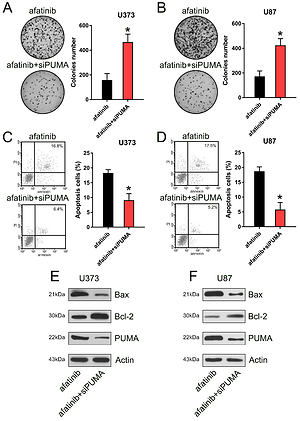Current issue
Archive
Manuscripts accepted
About the Journal
Editorial office
Editorial board
Section Editors
Abstracting and indexing
Subscription
Contact
Ethical standards and procedures
Most read articles
Instructions for authors
Article Processing Charge (APC)
Regulations of paying article processing charge (APC)
NEUROLOGY / EXPERIMENTAL RESEARCH
PUMA mediated afatinib-induced apoptosis in glioma cells
1
Zibo Central Hospital, China
2
Medical College of Yan'an University, China
3
Affiliated Hospital of Hubei University of Arts and Science, Xiangyang Central Hospital, China
Submission date: 2019-12-21
Final revision date: 2020-03-13
Acceptance date: 2020-04-01
Online publication date: 2021-04-05
Corresponding author
KEYWORDS
TOPICS
ABSTRACT
Introduction:
Afatinib exhibits a tumor-inhibiting effect in different cancers by inducing apoptosis; however, its pro-apoptosis role in glioma cells is still not fully understood.
Material and methods:
In the current study, two glioma cell lines (U373-MG and U87-MG) were treated with afatinib to measure their tolerance for afatinib-triggered cell death and apoptosis.
Results:
We found that afatinib treatment repressed both growth and proliferation and induced apoptosis in glioma cells. Moreover, it increased the expression of pro-apoptotic p53-upregulated modulator of apoptosis (PUMA). The influence of PUMA on afatinib-triggered apoptosis was assessed by PUMA overexpression and knockdown in glioma cell lines. PUMA overexpression resulted in increased sensitivity of glioma cell lines toward afatinib, whereas its knockdown abated the effect of afatinib on apoptosis. Similarly, the in vivo potency of afatinib on U373-MG xenograft tumors in wild type (WT) and PUMA knockdown nude mice was measured. Afatinib treatment reduced the weight and volume of WT xenograft tumors but did not have the same effect on PUMA knockdown xenograft tumors. Afatinib also induced significant cell death and apoptosis in WT xenograft tumors but not in PUMA knockdown xenograft tumors.
Conclusions:
Afatinib induces apoptosis in glioma cells by mediating PUMA expression. This study warrants further investigation into the mechanism of afatinib in glioblastoma treatment.
Afatinib exhibits a tumor-inhibiting effect in different cancers by inducing apoptosis; however, its pro-apoptosis role in glioma cells is still not fully understood.
Material and methods:
In the current study, two glioma cell lines (U373-MG and U87-MG) were treated with afatinib to measure their tolerance for afatinib-triggered cell death and apoptosis.
Results:
We found that afatinib treatment repressed both growth and proliferation and induced apoptosis in glioma cells. Moreover, it increased the expression of pro-apoptotic p53-upregulated modulator of apoptosis (PUMA). The influence of PUMA on afatinib-triggered apoptosis was assessed by PUMA overexpression and knockdown in glioma cell lines. PUMA overexpression resulted in increased sensitivity of glioma cell lines toward afatinib, whereas its knockdown abated the effect of afatinib on apoptosis. Similarly, the in vivo potency of afatinib on U373-MG xenograft tumors in wild type (WT) and PUMA knockdown nude mice was measured. Afatinib treatment reduced the weight and volume of WT xenograft tumors but did not have the same effect on PUMA knockdown xenograft tumors. Afatinib also induced significant cell death and apoptosis in WT xenograft tumors but not in PUMA knockdown xenograft tumors.
Conclusions:
Afatinib induces apoptosis in glioma cells by mediating PUMA expression. This study warrants further investigation into the mechanism of afatinib in glioblastoma treatment.
Share
RELATED ARTICLE
We process personal data collected when visiting the website. The function of obtaining information about users and their behavior is carried out by voluntarily entered information in forms and saving cookies in end devices. Data, including cookies, are used to provide services, improve the user experience and to analyze the traffic in accordance with the Privacy policy. Data are also collected and processed by Google Analytics tool (more).
You can change cookies settings in your browser. Restricted use of cookies in the browser configuration may affect some functionalities of the website.
You can change cookies settings in your browser. Restricted use of cookies in the browser configuration may affect some functionalities of the website.



